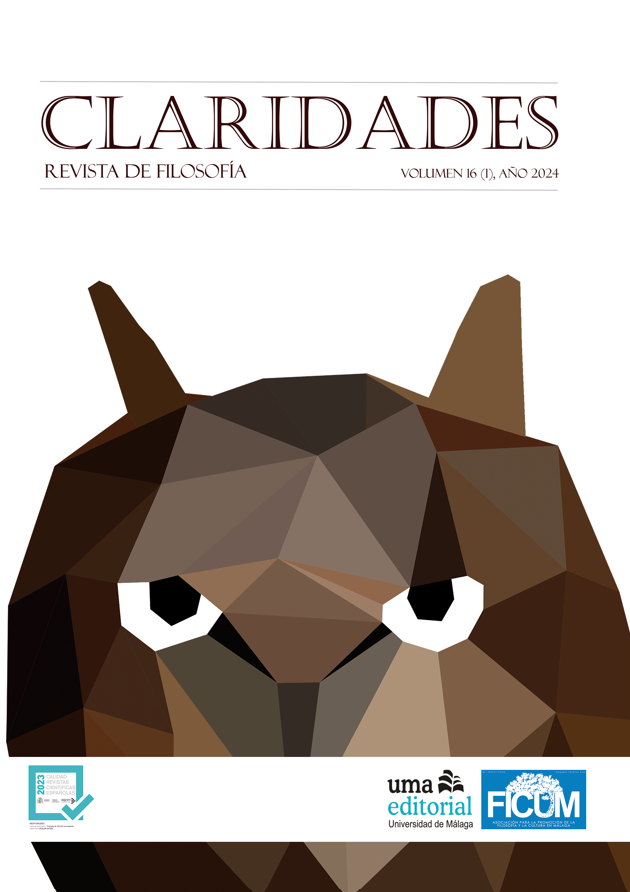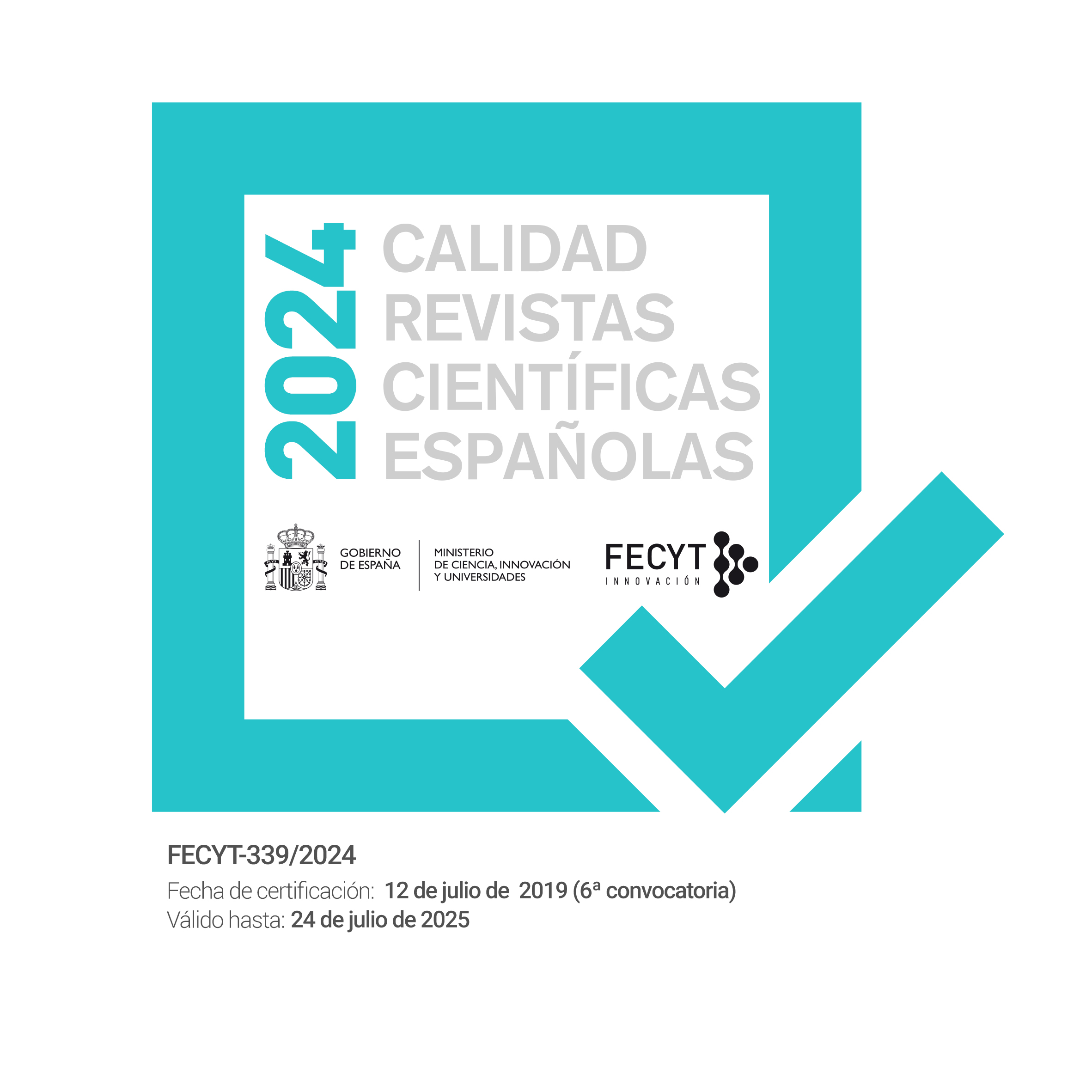Temporality and finiteness:
Existential having-been and future death on the way to Sein und Zeit
DOI:
https://doi.org/10.24310/crf.16.1.2024.16534Keywords:
Heidegger, Temporality, Finiteness, Death, ExistenceAbstract
The aim of the following paper is to elucidate how, from the finitude of existence, the problematic of temporality can be established within the framework of Martin Heidegger's thought. To this end, we will analyse the 1924 lecture Der Begriff der Zeit, one of the texts that pave the way for Sein und Zeit, instead of focusing our investigation on Heidegger's considered masterpiece. A reflection on this earlier text will advance the analysis of existence by showing how time is rooted in individual existence, not as a solipsism, but as an opening of possibilities with respect to the world (ultimately shared with others). A phenomenological description of death will make it possible to open up to the world, defining an existential temporality that includes not only the present instant, but also the past (conceived in the form of "having-been") and the future.
Downloads
Metrics
Publication Facts
Reviewer profiles N/A
Author statements
Indexed in
-
—
- Academic society
- N/A
- Publisher
- Asociación para la promoción de la filosofía y la cultura en Málaga (FICUM) y UMAEditorial
References
Adrian Escudero, J. (2011): El lenguaje de Heidegger. Diccionario filosófico 1912-1927. Barcelona: Herder.
Adrián Escudero, J. (2016): Guía de lectura de «Ser y Tiempo» de Martin Heidegger (2 Vol.), Barcelona: Herder.
Arendt, A.; Heidegger, M. (1999): Briefe 1925 bis 1975 und andere Zeugnisse. Frankfurt am Main: Klostermann.
Ariès, P. (1977): L'homme devant la mort. París: Seuil.
Aristóteles (1995): Física (Trad. G. R. de Echandía). Madrid: Gredos.
Bergson, H. (2015): Oeuvres Completes (2 vol.). París: Livre de Poche.
Bultmann, R. (1995): Die Geschichte der synoptischen Tradition. Göttingen: Vandenhoeck & Ruprecht.
Bultmann, R. (2009): Briefwechsel 1925-1975, Frankfurt am Main: Klostermann.
Blume, D.; Boll, M.; Gross, R. (Eds.) (2022): Hannah Arendt y el siglo XX (Trad. M. J. Viejo Pérez). Barcelona: Paidós.
Capobianco, R. (2014): Heidegger's way of Being. Toronto: Toronto University Press.
Ettinger, E. (1995): Hannah Arendt/Martin Heidegger. New Haven: Yale University Press.
Faye, E. (2016): Arendt et Heidegger. Extermination nazie et destruction de la pensée. París: Albin.
Gadamer, H.-G. (2017): Los caminos de Heidegger (Trad. Á. Ackermann). Barcelona: Herder.
Gilabert, F. (2020): «Aeternitas vs. Aei. Heidegger y la ruptura con la teología», Analele universitatii din Craiova. Serie Filozofia, 46, pp. 75-91.
González Varela, N. (2017): Heidegger. Nazismo y política del ser. Vilassar de Dalt (Barcelona): Montesinos.
Han, B.-C. (2018): Muerte y alteridad (Trad. A. Ciria). Barcelona: Herder.
Heidegger, M. (1988): Ontologie. Hermeneutik der Faktizität. GB 63. Frankfurt am Main: Klostermann.
Heidegger, M. (1990): Unterwegs zur Sprache. Neske: Pfüllingen.
Heidegger, M. (1991): Grundbegriffe (Sommersemester 1941). GB 51. Frankfurt am Main: Klostermann.
Heidegger, M. (1992): Was ist das - die Philosophie? Pfüllingen: Neske.
Heidegger, M. (1997): Die Grundprobleme der Phänomenologie (Sommersemester 1927). GB 24. Frankfurt am Main: Klostermann.
Heidegger, M. (2003): Holzwege (1935-1946) GB 5. Frankfurt am Main: Klostermann.
Heidegger, M. (2003): Zollikoner Seminare. Protokolle - Zwiegesprache - Briefe. Frankfurt am Main: Klostermann.
Heidegger, M. (2004): Der Begriff der Zeit (1924). GB 64. Frankfurt am Main: Klostermann.
Heidegger, M. (2006): Sein und Zeit (1927), Tübingen: Niemeyer.
Heidegger, M. (2011). El concepto de tiempo. Conferencia de 1924 (Trad. y pról. R. Gabás Pallas y J. Adrián Escudero). Madrid: Trotta.
Jonas, H. (2003): Erinnerungen. Frankfurt am Main: Insel.
Levinás, E. (1993): Dieu, la mort et le temps. París: Grasset.
Levinás, E. (1993): El Tiempo y el Otro (Trad. F. Duque). Barcelona: Paidós.
Lythgoe, E.; Rossi, L. A. (2016): Ser y tiempo, singularización y comunidad. Buenos Aires: Biblos.
Peñalver, P. (1989): Del espíritu al tiempo. Lecturas del «El ser y el tiempo» de Heidegger. Barcelona: Anthropos.
Pöggeler, O. (1993): El camino del pensar de Martin Heidegger (Trad. F. Duque). Madrid: Alianza.
Pöggeler, O. (2014): Philosophie und hermeneutische Theologie: Heidegger, Bultmann und die Folgen. München: Fink.
Rodríguez, R. (Ed.) (2018): Guía Comares de Heidegger. Granada: Comares.
Sagrada Biblia (1995) (Trad. E. Nacar y A. Colunga). Madrid: BAC.
Safranski, R. (2007): Un maestro en Alemania. Martin Heidegger y su tiempo. Barcelona: Tusquets.
Severino, E. (1982): Essenza del nichilismo. Milano: Adelphi.
Vattimo, G. (1971): Introduzione a Heidegger, Roma: Laterza.
Downloads
Published
How to Cite
Issue
Section
License
Copyright (c) 2023 Fernando Gilabert Bello

This work is licensed under a Creative Commons Attribution-NonCommercial-ShareAlike 4.0 International License.
Esta revista provee acceso libre inmediato a su contenido bajo el principio de hacer disponible gratuitamente la investigación al público. Todos los contenidos publicados en Claridades. Revista de Filosofía, están sujetos a la licencia Creative Commons Reconocimento-NoComercia-Compartirigual 4.0 cuyo texto completo puede consultar en <http://creativecommons.org/licenses/by-nc-sa/4.0>
Es responsabilidad de los autores/as obtener los permisos necesarios de las imágenes que están sujetas a derechos de autor.
Los autores/as cuyas contribuciones sean aceptadas para su publicación en esta revista conservarán el derecho no exclusivo de utilizar sus
contribuciones con fines académicos, de investigación y educativos, incluyendo el auto-archivo o depósito en repositorios de acceso abierto de cualquier tipo.
La edición electrónica de esta revista esta editada por la Editorial de la Universidad de Málaga (UmaEditorial), siendo necesario citar la procedencia en cualquier reproducción parcial o total.

















6.png)
